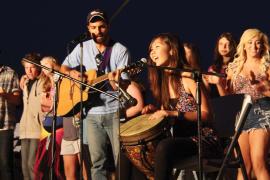Summer camp was initially established as a “back to nature” retreat for the children of wealthy New Englanders. It was a respite from the degradation of urban life. Over the years, with the help of myriad religious, educational, and social professionals, summer camps evolved into the blueprint for modern childhood. It became an evolving articulation of what our society deemed most beneficial for the growth and well-being of our children; a place where the values of self-reliance, respect, personal responsibility, fun, and camaraderie are instilled.
My father regularly encouraged me to go to summer camp at a young age. He would tell me about the camps he went to in upstate New York and how his camp experiences were some of the best times of his life. I was unsure about taking such a long trip away from home, and it wasn’t until 1996 that I headed off for my first summer of fun. Following that summer, I remember my father asking my brother and me to chip in money from our allowance after the holidays to help send a child to camp. At that young age, I wondered why my father was sending someone to camp that we didn’t even know. He said plainly, “He can’t go without our help. Isn’t it the right thing to do if we are able?” My father wasn’t overly philanthropic, but each year he continued to send a couple of children to camp. A few years after he passed away, The Scott-Free Scholarship Foundation was created in his name and memory.
The Scott-Free Scholarship Foundation is a North Carolina–based 501(c)(3) organization that pairs at-risk children with unique summer camp opportunities. Funding exists primarily through tax- deductible donations from both businesses and individuals; however, many of the opportunities exist through the generosity of camps that partner with Scott-Free. Camps typically find value in having third- party camp organizations complete camper profiles and will often offer full or partial scholarships for deserving youths. We hope that by pairing at-risk children with programs that offer sports, technology, theater, music, arts, and an educational curriculum, we can help nurture an already-identified talent or even help them discover others. Learning and practicing in a safe, stable, and structured environment promotes healthy self-confidence and self-worth crucial to the development of any child.
Case by Case
Each applicant for a Scott-Free scholarship presents a unique set of challenges that are considered during the review process. Eligibility is determined on a case-by-case basis. Applicants are typically referred by educational professionals at participating elementary and middle schools as well as a variety of local nonprofit organizations. Scott-Free’s volunteer workforce assists applicants through a preapplication process (which can last months) to learn about the applicant’s background, talents, and interests. That information is used to pair each applicant with a well-suited summer camp experience. The applicant’s family then completes the specific camp application, which is reviewed and submitted by Scott- Free. To encourage a sense of civic responsibility in all scholarship recipients, campers who wish to be considered for a subsequent year of support must perform four hours of community service and complete two essays, one detailing their summer camp experience and the other detailing their community service experience, along with a signed letter of confirmation.
The Common Denominator
Since its inception in 2008, Scott-Free has sent 213 children to the summer camp of their choosing. Scholarship recipients span the entire spectrum of needs — no two children are the same. The one common denominator among recipients is a positive attitude and commitment to self-improvement. Scott-Free has had the pleasure of supporting an array of talented children, some with already-identified talents and others with only the hope of a new opportunity. As we continue to work with an ever-growing community with ever-changing demographics, it has become increasingly clear that third- party camp providers are key to providing support in their community. We can fill in where children may otherwise slip through cracks. Providers can also lend supple-mental support that doesn’t quite fit within the boundaries of a summer camp, school, or religious institution. Third-party camp providers have the ability to be flexible and creative in tailoring their support to best suit emerging needs. The support can often be the push children need to reach the next stage in life or simply to survive day to day.
Chain of Support
The importance of a third-party camp provider like Scott-Free is routinely under-stated in the context of the bigger picture. Many times, we are an invisible link in a long chain of support, which helps reverse the downward trajectory of a child’s life. Scholarship recipient Sean (name changed), with the help of Scott-Free, was determined to do just that. After growing up in a home absent of a father and affected by drug addiction, Sean filed for emancipation and began bouncing between family members as a child, even being classified as homeless for a period of time in middle school.
In 2011, with the support of Scott-Free, Sean attended track and field summer camp at the University of North Carolina, Chapel Hill (UNC). Before camp, Sean had never attended a college game or stepped on a college campus. Scott- Free was able to streamline the process for Sean by obtaining school records, providing transportation, and securing a safe environment to sleep on Sean’s behalf. Having never left his hometown, UNC track camp opened up his eyes to a world of possibilities. Sean attended UNC track camp again in 2012 and cites both years as life changing in his athletic development.
Sean is currently a sophomore at Clayton High School, and while he still runs track and field, he has developed a passion and talent for football. With only one year of organized football under his belt before high school, he quickly excelled to become the defensive player of the year as a freshman on the junior varsity team. This past year, Sean was named to the all- conference team and was recruited to play on the varsity team for the playoffs. He has shown such improvement and potential in his first two seasons that his coaches are optimistic after his junior season that he’ll be able to enroll in a preparatory academy where he can further develop as a football player and young man.
Measuring the impact a third-party camp provider like Scott-Free has on children can be difficult in the present, as is the case with Sean. However, over the last five years, Scott-Free has been fortunate enough to see true growth and accomplishment by those who have now outgrown its support.
No scholarship recipients embody the vision and purpose of Scott-Free more than Carter and Wyatt Coleman. Scott-Free met these talented twin musicians in 2008. At fourteen, they were passionate about the violin but felt their talent had reached its ceiling. They lacked the instruction and the direction they needed to reach the next level. Both had raised money by performing at countless events around the community but still lacked the money necessary for any nonlocal programs. Through the support of Scott-Free and private donors, they attended a prestigious music academy in Vermont in both 2008 and 2009.
Over those two summers, both Wyatt and Carter flourished at Green Mountain Music Academy (GMMA). Wyatt credited that time with helping him to find a confident voice and express himself musically. “I discovered talents I never knew I had, and that reinvigorated my interest in violin.” Carter referenced a moment during the second year of GMMA as a turning point in his life. “While watching a string quartet perform, I finally realized how to really listen to classical music. I’ve always played it, but I never appreciated the beauty and purpose until then. That’s when I realized I wanted to play music professionally.” During the school year, each continued to study with his respective instructor and perform as members of the North Carolina Symphony Young All Stars and Mallarme Youth Chamber Orchestras. Carter became the concertmaster of the Triangle Youth Philharmonic, while Wyatt was the second violinist of the Turismo Quartet.
Further recognition came in 2010, when Carter and Wyatt were invited to the International Music Academy (IMA) in Pilsen, Czech Republic. The Colemans again found themselves lacking the financial resources to attend. But again, with the support of Scott-Free and additional private donors, the Coleman twins made their first tour out of the country. During the four-week program, they had a chance to study regularly with Kirsten Yon, who was at the time the associate professor of violin at Texas Tech. Kirsten, who would help shape the coming years of their lives, remembered working with them for the first time and how distinct their personalities were. “Carter was like a ball of raw energy, while Wyatt was very reserved and cautious.” She explained how interesting it was to watch them grow through music. “Carter was able to tame and focus his energy through music, and as Wyatt grew, his caution cracked and a powerful musical voice emerged.” After the IMA, Carter and Wyatt aged out of Scott-Free eligibility but maintained contact through the next stage of their lives.
Carter recently completed his first year at the Cleveland Institute of Music studying under the instruction of William Preucil, concertmaster of the Cleveland Orchestra, while Wyatt currently studies under Kirsten Yon at the University of Houston. Remarkably, both of them are attending their respective institutions on music scholarships. While Carter is working toward his dream of becoming a professional violinist, Wyatt is majoring in music and biology with plans to attend UNC Dental School upon graduation, an interest he’s had since the sixth grade. Wyatt was worried that he wouldn’t be able to afford college, thereby missing his chance at dental school, but music offered new opportunities he didn’t know existed. “After realizing I could pursue music as a means to attend school, I poured all of my efforts into it.”
Wyatt spoke to Kirsten Yon during his time at the IMA about his career aspirations, which she encouraged. Kirsten, who had recently become the associate professor of violin at University of Houston, offered Wyatt a scholarship to study music while pursuing dental school. “It takes courage to be willing to identify more than one passion at such a young age. I admire him for committing the time and energy to music as a tool to pursue these other dreams he has.” Kirsten said of both Carter and Wyatt, “They are extremely unique in personality and disciplined in their craft. They both have a keen self-awareness that music has helped to feed.” Scott-Free is rarely the direct catalyst of change or growth in any of the lives it touches. We merely make every effort to ensure that opportunity is possible.
Maximize Potential
A far-too-common obstacle for third-party providers is a lack of available resources to support its mission. In an effort to minimize that risk and maximize its potential, Scott-Free is constantly looking for ways to increase efficiency and identify additional sources of funding. Since inception, Scott-Free has operated mainly within the North Carolina and Virginia region, but in the future we hope to extend our reach by partnering with new camps and creating awareness within new communities.
Joshua Gruder recently relocated to Raleigh, North Carolina, from Washington, DC. He currently works with the Scott-Free Scholarship Foundation as its strategic development manager. To learn more about Scott-Free, please visit www.scott-free.org.
Originally published in the 2013 September/October Camping Magazine.


